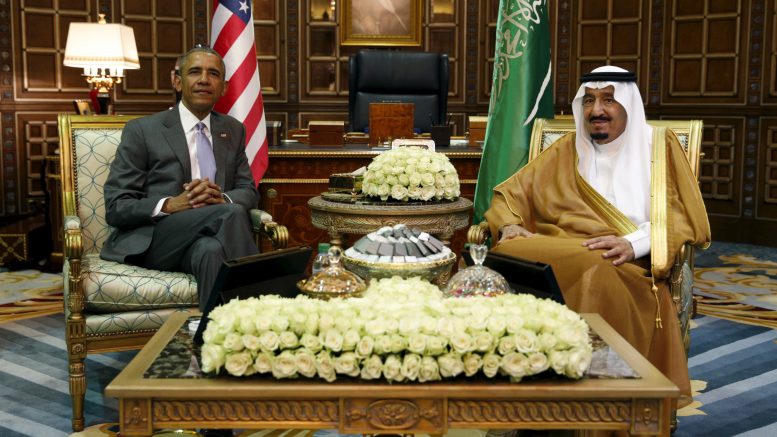HARI SREENIVASAN: The tense state of relations between the U.S. and Saudi Arabia has been roiled lately by two issues: a pending bill in Congress that would allow lawsuits against countries found to have been involved in terrorist attacks on American soil, and the so-called “28 pages,” parts of a congressional inquiry after September 11th that are said to detail possible Saudi complicity in aiding the attacks.
Here to tell us more about both is chief foreign affairs correspondent Margaret Warner.
So, first, let’s talk about the bill, what’s in it and what’s the status of it.
MARGARET WARNER: The bill, Hari, would carve out a special exemption in what’s called the Foreign Sovereign Immunity Act which every country has a similar act and observe, which is you don’t sue foreign governments, with a few narrow exceptions. There was an exception made for terrorism, but only if you were on the state-sponsored terrorism list which Saudi isn’t.
So, these 9/11 victims families have been trying to push this, get this bill in a court. It was rejected by a federal judge in September saying, sorry, violates this act. So that’s sort of what’s new here.
It passed unanimously a session ago in the Senate, but now, it’s run into a buzz saw of White House opposition. You have President Obama telling Charlie Rose if we let this happen we’ll have foreign citizens suing our government. All the senior members of the administration have come out against this.
So, and then, last — two weeks ago, Senator Lindsey Graham, one of the 22 co-sponsors and lawyer by training put a hold on the bill. So, people thought it was dead. But several widows came to see him last week. He was working on language. And today, I learned very quietly he removed his hold on Tuesday.
So, what’s happening now is that the two main co-sponsors, Republican John Cornyn and Democrat Chuck Schumer of New York are essentially counting heads. They want to make sure nobody in their caucus objects, no one else is going to put a secret hold on it, and then they’ll ask Mitch Zeller if he will bring it to the floor.
HARI SREENIVASAN: What role do the 28 pages play in this. They’re discrete but melt together.
MARGARET WARNER: Yes, they do. And a lot is sort of a public relations side. A White House official said to me that “60 Minutes” report that appeared, what, three weeks ago in which the head of the congressional investigation, co-sponsor Bob Graham, and three of the 9/11 Commission members, which you know was an independent, came out and said there is very — they didn’t say “evidence” but strong signs of Saudi complicity in aiding some of the hijackers — as we recall 15 of the 19 were Saudis — and in particular the two who were in San Diego.
You know, mysteriously, they meet a man who gives them an apartment, and these are two guys who don’t speak any English and have had no experience living in the West. So, there are a lot of threads in there. What one White House official said is that “60 Minutes” report has been like is that rocket has been a booster to the Saudi lawsuit bill.
And a top staffer of one of the senators involved said much the same. He said, we were kind of bumping along on the Saudi lawsuit bill, and suddenly, it’s front and center.
HARI SREENIVASAN: Likely to turn into a presidential campaign issue?
MARGARET WARNER: Well, maybe. The thing is that both Hillary Clinton and Donald Trump have actually endorsed the Saudi lawsuit bill and especially when they were in New York and on New York radio and television. So, I don’t — I think the only thing that could become political is if President Obama, who is supposed to decide on the 28 pages, supposedly by the end of next month, if he were to say I’m not releasing them, then it could be an issue.
HARI SREENIVASAN: What’s the White House’s reaction been to all this?
MARGARET WARNER: Oh, the White House is apoplectic. And the way one senior, very senior official just before the president was going to Saudi Arabia, he said this is the last thing we need. The Saudis are violently opposed to this. They say they don’t mind releasing 28 pages, but they feel they’re being absolutely, you know, put in the crosshairs on this bill and, in fact, at one point, the foreign minister threatened to sell all of their assets, foreign assets, 750 billion on the market. He since rescinded that but still they are very concerned.
HARI SREENIVASAN: Chief White House correspondent Margaret Warner, thanks so much.
MARGARET WARNER: Thank you.
Source: www.pbs.org





Be the first to comment on "The Political Battle Over the Saudi Lawsuit Bill and the #28 pages"